Brain and free will, how do we make decisions actually
A Life / / December 19, 2019
We used to think that making decisions consciously. But what if our consciousness only states the fact of choice? That's what scientists say.
What decides: consciousness or unconsciousness
The existence of free will has been questioned in the 80-ies of XX century after the studyTime of conscious intention to act in relation to onset of cerebral activity (readiness-potential). The unconscious initiation of a freely voluntary act. Benjamin Libet (Benjamin Libet).
experiment, participants were asked to spontaneously move the wrist and at the time monitored the activity of their brain. It turned out that his reaction ahead of the conscious intention of an average of 350 milliseconds. That is, people may not realize that moves the wrist, and his brain had already decided to do so. This pre-reaction of the brain It called the readiness potential.
Libet concluded that a conscious choice does not exist. Any decision taken unconsciously, and consciousness only registers it.
Only 30 years after the opening of Libet's study appeared, that allow to doubt his theory, namely, that the capacity for preparedness - is an unconscious decision to action.
Preparing unconscious, consciousness decides
In 2009, scientists from the University of Otago checkedBrain preparation before a voluntary action: Evidence against unconscious movement initiation Libet's theory by modifying the experiment itself. In their version, participants waited for the sound signal, and then had to make a choice: press a key or not. It turned out that the action or lack of it does not matter - the potential of readiness there anyway.
The same is found in the studyReadiness potentials driven by non-motoric processes. 2016: strong potential willingness not end the movement. Moreover, after the readiness of the potential occurrence of a person can The point of no return in vetoing self-initiated movementsstop and perform the movement.
Once the potential availability is, and the action does not, then it does not indicate a decision to act.
What then does this brain activity? There are different opinions.
French explorer Shurger Aaron (Aaron Schurger) advancedAn accumulator model for spontaneous neural activity prior to self-initiated movement the theory that the readiness potential - it's just the growth of neural noise, random electrical oscillations in neural networks.
Alexander Prescott (Prescott Alexander) from Dartmouth College suggestedReadiness potentials driven by non-motoric processes.That this brain activity reflects the general expectation - the knowledge that the event will take place soon.
Eric Emmons (Eric Emmons) from the Department of Neurology tied in Iowa State UniversityRodent Medial Frontal Control of Temporal Processing in the Dorsomedial Striatum potential with a sense of readiness time. The scientist suggested that since our brain encodes own time intervals. Since Libet experiment, people had to do to track and approximately represent time intervals, this theory may very well be true.
Whichever may have been true, it turns out that freedom of will all still there, but the potential availability only shows the processes that occur during the decision-making.
see also
- 7 strange things to which our brain is programmed →
- 7 reasons to trust your brain →
- As consciousness beyond the body without any esoteric →



